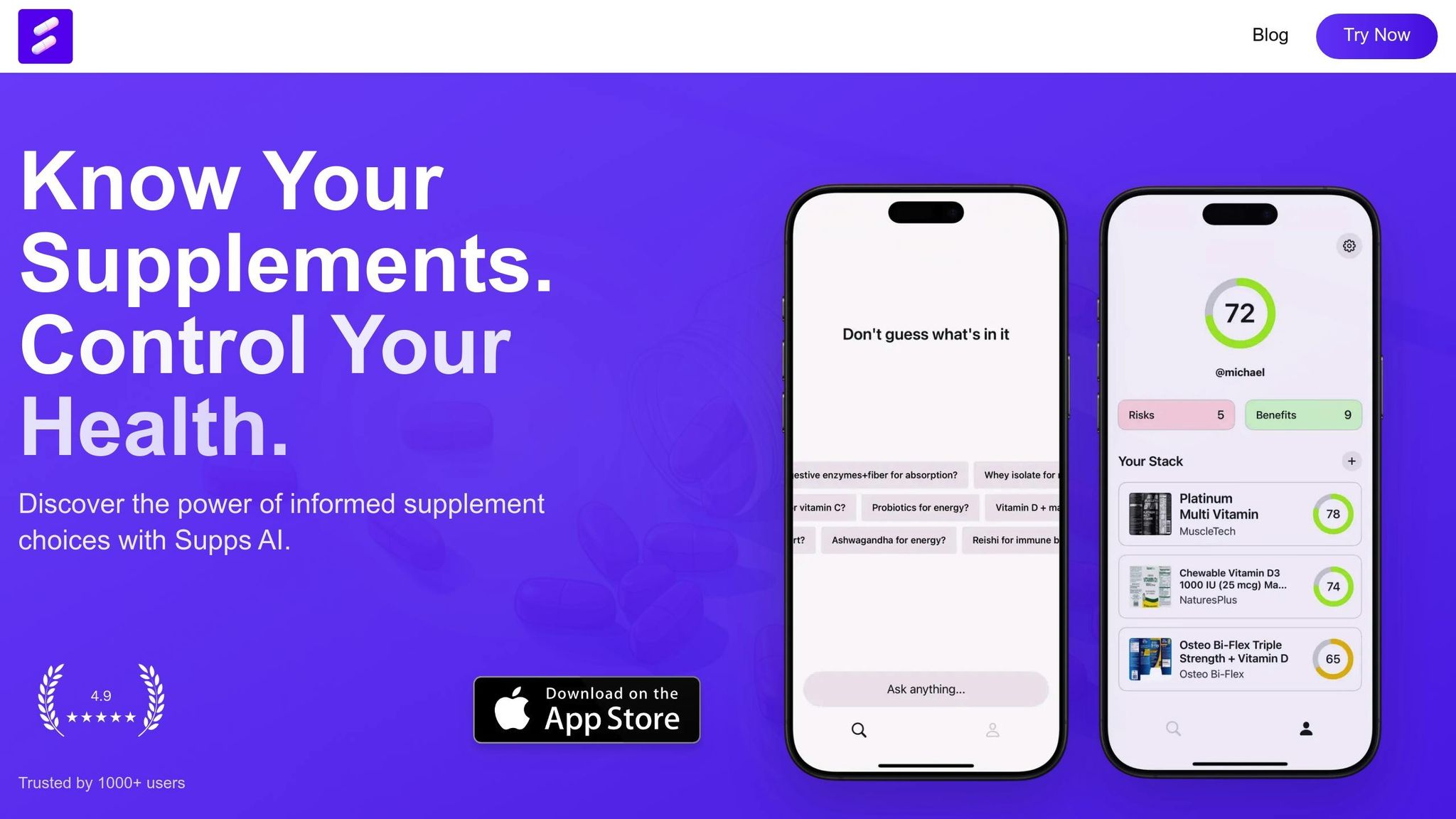
Are Personalized Supplements Worth It?
Personalized supplements promise to tailor nutrition to your unique needs using AI and health data. But are they better than regular store-bought options? Here’s a quick breakdown:
- Personalized Supplements: Use AI to assess health data (e.g., genetics, lifestyle) for precise nutrient dosing. Costs range from $25–$100+ monthly. They may improve energy, sleep, and mood but are pricier.
- Store-Bought Supplements: Affordable ($5–$15 monthly) and convenient but offer generic formulas with standardized dosages that might not meet individual needs.
Quick Comparison
| Factor | Personalized Supplements | Store-Bought Supplements |
|---|---|---|
| Monthly Cost | $25–$100+ | $5–$15 |
| Dosage Accuracy | Tailored to personal data | Generic, standardized |
| Added Features | Health tracking, consultations | None |
| Convenience | Auto-delivery, pre-sorted packs | Manual purchase required |
Personalized supplements might be worth it if you have specific health concerns or nutrient deficiencies. Otherwise, store-bought options can work for general needs.
Personalized Supplements: Cutting Edge Health? What Science Says
1. Supps AI Analysis

Supps AI takes personalized supplement recommendations to the next level with its advanced AI platform. It evaluates a database of 2,044 supplements, 2,866 drugs, and 59,096 documented interactions to provide science-backed suggestions.
By leveraging natural language processing on approximately 22 million PubMed papers, its BERT-DDI model achieves impressive results: 87% overall accuracy, 77% precision, and 96% recall in identifying supplement interactions. These metrics highlight its ability to deliver reliable, personalized recommendations.
"We [set out to build a system] that can perform massive retrieval of [drug-supplement interaction] evidence over the scientific literature, and then organize it and make it available for consumers, physicians, for researchers - for anyone who's looking to discover information about supplements at scale."
- Lucy Lu Wang, PhD student at the University of Washington and lead author on the Supps AI paper
The platform has shown measurable improvements in health outcomes compared to traditional supplement approaches:
| Health Condition | Improvement with Precision Recommendations |
|---|---|
| Severe Depression | 36% better outcomes |
| Severe Anxiety | 40% better outcomes |
| Severe IBS | 38% better outcomes |
| Type 2 Diabetes Risk | 30% improvement in risk score (high adherence) |
These results demonstrate how AI-driven insights can outshine conventional methods in both effectiveness and safety. The system ensures the use of high-quality evidence by prioritizing non-retracted studies, clinical trials, human research, and recent findings.
Supps AI is also designed for practical use. A Premium Plan, priced at $4.99 per week, offers in-depth AI analysis and interaction tracking, while a free version provides basic insights. Its barcode scanning feature allows users to quickly access supplement efficacy data, making it easy to integrate into daily routines.
Safety is another key focus. With 88% of adults over 65 using supplements and 15% at risk of serious drug interactions, the platform identifies potential conflicts that traditional databases often miss. This addresses a critical gap in supplement safety and ensures better protection for users.
sbb-itb-79d218a
2. Regular Store-Bought Supplements
Around half of American adults use store-bought supplements like vitamins, minerals, botanicals, amino acids, and probiotics. Their easy availability in pharmacies and retail stores makes them a popular choice. However, this convenience comes with certain limitations, especially when it comes to meeting individual needs.
One big plus for store-bought supplements is their affordability. They cost significantly less than personalized options, but this price difference often reflects differences in how well they work and how precisely they meet individual requirements:
| Aspect | Store-Bought Supplements | Personalized Solutions |
|---|---|---|
| Monthly Cost | $5–15 | $25–100+ |
| Dosage Precision | Standardized dosages | Tailored to individual needs |
| Nutrient Selection | Pre-determined combinations | Based on personal requirements |
The standardized formulas found in traditional supplements often miss the mark when it comes to addressing specific health needs. This "one-size-fits-all" method can lead to mixed or even ineffective results for many users.
"Combination supplements usually contain doses too low to work -- they cram 30 ingredients at trace amounts into a capsule at doses that will never work."
– Dr. Stephanie Redmond, pharmacist and co-founder of DiabetesDoctor
Dr. Redmond’s critique highlights a common issue with these products: they often include too many ingredients in insufficient amounts to make a real difference. While about one-third of Americans take daily multivitamins, research suggests these generic blends may not do much to lower disease risks.
That said, store-bought supplements can still help with common deficiencies. For example, calcium and vitamin D support bone health, and fiber aids digestion. But they don’t usually take into account factors like your current nutrient levels, specific health conditions, medications, personal goals, or dietary needs. This lack of personalization can limit their effectiveness.
Key Benefits and Drawbacks
This section highlights the pros and cons that can impact your choice between personalized and store-bought supplements. Factors like cost, precision, added services, and scientific support play a big role in the decision-making process.
Here's a breakdown of the key differences:
| Factor | Personalized Supplements | Store-Bought Supplements |
|---|---|---|
| Monthly Cost | $25–100+ | $5–15 |
| Nutrient Selection | Tailored to individual needs using data | Standardized "A to Z" formulas |
| Dosage Accuracy | Specific amounts based on personal data | Generic doses, often ineffective |
| Additional Services | Health tracking, expert consultations, regular updates | None |
| Convenience | Auto-delivery, pre-sorted daily packs | Manual purchase and sorting |
| Scientific Basis | Based on personal health and lifestyle data | Broad population-based studies (RDA) |
This comparison helps weigh the benefits of personalized supplements against their higher costs and added features.
In 2020, the personalized supplement market reached $1.8 billion, with the average monthly spend hovering around $50. Pricing varies widely among top providers:
- Persona Nutrition: Prices range from $1.68 to $86 per product, with free consultations from nutritionists.
- Ritual: Offers targeted formulations priced between $25 and $54 per month.
- HUM Nutrition: Products cost between $12 and $92.
"The prices these companies are charging seem a bit ridiculous." - Professor Margaret Rayman
One major advantage of personalized supplements is their targeted approach. By eliminating unnecessary ingredients and focusing on specific health needs, they may reduce the risk of side effects compared to generic multivitamins.
However, not everyone is convinced. Dietitian Emily Burch cautions, "Many companies selectively emphasize studies with limited evidence".
And Professor Clare Collins adds,
"I think some people see vitamins as an extra insurance policy, but they're not without harm. If you don't need them, the water-soluble ones you're weeing out and the fat-soluble ones just get stored in your adipose tissue or your liver. But if you eat more vegetables instead, there are no harms, only benefits."
Personalized supplements rely on digital assessments of diet, fitness, and lifestyle to create tailored recommendations. These AI-driven tools connect individual health data with specific nutrient needs. While this approach offers greater precision than generic options, online quizzes and surveys used for personalization may not always be accurate.
These points help set the stage for deciding if personalized supplements are the right fit for your health goals.
Should You Choose Personalized Supplements?
A 2023 study found that tailored dietary programs led to better health outcomes compared to generic advice.
These programs might be a great fit for:
- People with known nutrient deficiencies. For example, 54% of Elo members were found to have low vitamin D levels.
- Those looking to improve metabolic health.
- Individuals dealing with nutrient absorption challenges.
If you don't have specific health concerns, standard supplements might work just fine.
What Are the Benefits?
Participants in personalized programs reported:
- Better energy levels: 43% experienced improvements, compared to 11% with standard advice.
- Improved sleep quality: 35% saw benefits, compared to 9% with standard advice.
- Enhanced mood: 33% noted a boost, compared to 15% with standard advice.
Are They Cost-Effective?
While personalized supplements may cost more upfront, they can save money in the long run by reducing waste and improving efficiency. Research shows that 55% of personalized nutrition plans were cost-effective at a $20,000 threshold, rising to 75% at $50,000.
How to Maximize Results
To get the most out of a personalized supplement plan:
- Use up-to-date lab results for health assessments.
- Track your health markers regularly.
- Stay consistent - 79% of users in a personalized program took their supplements daily.